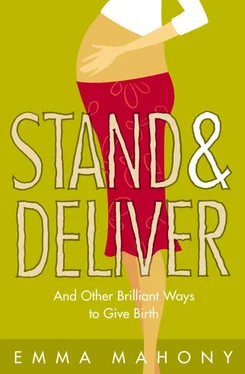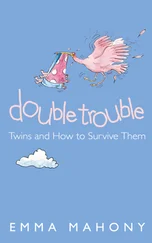When you go into hospital – a place that will always bring up some anxiety of being ill or visiting sick relatives – you do so as an intruder. As a woman you are not ill, just pregnant, but as you sit in the waiting room as one of many, you may begin to experience new pinpricks of fear that weren’t there before. In the ultrasound department, this fear may be coaxed out by giant posters on the wall showing photographs of your baby in utero looking like a visitor from outer space. Other posters will carry information about how you could already be harming your baby by smoking or drinking. In the waiting room there will be more posters of mothers cradling a newborn with a headline telling you Why Breast Is Best or another showing a baby sucking on a bottle of sugar, warning of the perils of giving juice in a bottle. The hospital atmosphere itself might make you start thinking new thoughts: ‘Will this baby be all right?’ or ‘Why do they want me to take a blood and urine test? Does everyone have these, or can they see that I am a bit thinner/fatter/taller/smaller than the woman next to me?’
Sometimes, talking to a doctor can be more confusing than enlightening, as strange words are used, as if you were already in the know: ‘We are measuring the nuchal fold,’ says the radiographer. ‘We are looking for protein in the urine,’ says the midwife, as if you had some understanding of its significance. The use of language like this builds a barrier between you and the people with the stethoscopes round their necks, and often you feel a little more helpless and a little more ignorant than before you went in.
Of course the picture I am painting may be far worse than in your corner of the country. Here in London every hospital antenatal appointment is double-booked, so you can wait over two hours for your precious five minutes with the consultant. Even in those five minutes, if you have a medical student present the doctor may not be addressing you but teaching while talking.
Testing, Testing, One, Two, Three
As well as the brief chats with the doctor, there are also all sorts of tests that you may have in your pregnancy. The main thing you need to know about all these tests is that of all the 760,000 women who fall pregnant in the UK every year, only a tiny, tiny percentage will have to alter the course of their pregnancy after being screened. Some of the tests, such as routine screening for gestational diabetes (where you are given a glucose drink to take beforehand and, unsurprisingly, your blood sugar levels go wild) are being abandoned now anyway. Peter Brocklehurst, Director of the National Perinatal Epidemiology Unit, has this to say about the GTT (Glucose Tolerance Test): ‘The test is unreliable, doctors do not know how to treat it, and anxiety in the minds of the woman and her carers could be raised, increasing the risk of the pregnancy ending in a Caesarean.’ 2
I’m not suggesting that some of these tests don’t have a place. The urine test to find out whether there is a certain protein in the pee to indicate pre-eclampsia (a pregnancy-induced condition that is treatable by early delivery of the baby) is a life-saver. But for the hundreds of thousands of women who are tested routinely during their pregnancies, and then retested because the result was mis-read or read as a ‘false positive’ – and who sometimes having to wait weeks for the result – this most magical time can turn into a fearful one. There is a lot to be said for ignorance being bliss, and my mother would argue that her 1960s generation, pre-ultrasound, was a lot better off when they simply looked forward to starting a family come what may. And this from a woman who didn’t know she was carrying twins until she went into labour!
Ultraconfusing Ultrasound
While ultrasound has its uses (such as assessing more accurate dates, identifying twins and the presentation of the baby for delivery at the end of the pregnancy), it carries with it ethical dilemmas that far outweigh its uses, and any mother who doesn’t want to be scanned during pregnancy is quite within her rights to refuse it.
When you learn that 20 years ago, when scanning was in its infancy, thousands of women were scared silly by being told their babies had ‘golf balls’ in the brain (which turned out to be perfectly healthy brain tissue), it reminds you how recent all this new technology is. The other day, a woman rang the AIMS helpline in tears when a sonographer told her to ‘come back next week, I can’t see the baby’s head’.
Some radical groups maintain that the effects of ultrasound on growing babies and adults in later life have never fully been researched. While the effects are obviously nowhere near as dramatic as the rise in childhood leukaemia after X-rays were used on pregnant women (and Britain was the last country to stop irradiating pregnant women), it nevertheless makes you wonder why we are exposing something as fragile as the beginnings of life to unproven technology.
What is also forgotten in the rush to wave the magic radiographer’s wand is how vulnerable pregnant women are to information. It’s no surprise that most women don’t want to know the sex of their child in this country (it is given as a rule in the States – unless the parents specifically request otherwise). We want that growing baby to be as protected as possible, a mystery up until the moment he or she is born. We don’t always want early expectations heaped upon him or her because of gender, size or some minor birth defect.
My first son was born with a cleft-lip and palate that was corrected by plastic surgery when he was three and six months old, and I am still glad that the ultrasound department failed to pick up this ‘anomaly’. It would have added anxiety and worry to the whole family during an otherwise stress-free pregnancy. I wouldn’t have changed the course of my pregnancy knowing this, but I might have looked up unregulated sites on the internet and then worried myself stupid with other people’s tales of woe.
Ultrasound is technology without responsibility. It is you, not the radiographer, who has to deal with the fall-out of whatever probability ratio the scan brings up, and whatever further tests you might be offered. As the Government announces plans to mass-screen every woman in the UK (at a cost of £153 million to us taxpayers), few people have questioned why. Some groups for people with disabilities have even described the decision as ‘mass eugenics’ by another name. One woman who had decided that she did not want ultrasound rang up the doctor’s surgery to inform them that she did not want to have her 13-week scan. The receptionist became shirty with her about her decision, and wouldn’t let her cancel. Finally, to put an end to the discussion, this woman simply reminded the receptionist that her baby was really none of the receptionist’s business.
So, before you even go in for your scan, discuss the bigger picture with your partner. Talk about what you can cope with as parents, and then decide on what you’ll do on that basis. Don’t feel you have to be put on the conveyor belt without a choice.
All this talk is really an attempt to shake up a few accepted views about what happens to you during your pregnancy, and to get you thinking about what you want for yourself and your new family. You have all the answers, it may just require digging a little deeper to find them.
For example, all women know deep down where they would feel comfortable and safe giving birth. Even if your reasons might seem ridiculous to someone else, you know best. My mother wanted to have my elder brother at home in Norfolk because she was convinced that her first-born might get switched in the hospital nursery at night. Fortunately she had a sympathetic doctor who agreed to a home birth to save her worrying further. My 11-lb brother (ouch!) was born with a fire flickering in the grate, the midwife knitting in the armchair, chucking her cigarette butts into the fire as the hours wore on (my, how times have changed). Who is to say my mother was wrong, or should have been persuaded to do otherwise (as she would have today when the scan showed a baby of that size)? Who is even to say that her worst fear might not have come true, as women are often spookily intuitive during pregnancy, and seem to know things that are not explainable in a rational way?
Читать дальше












